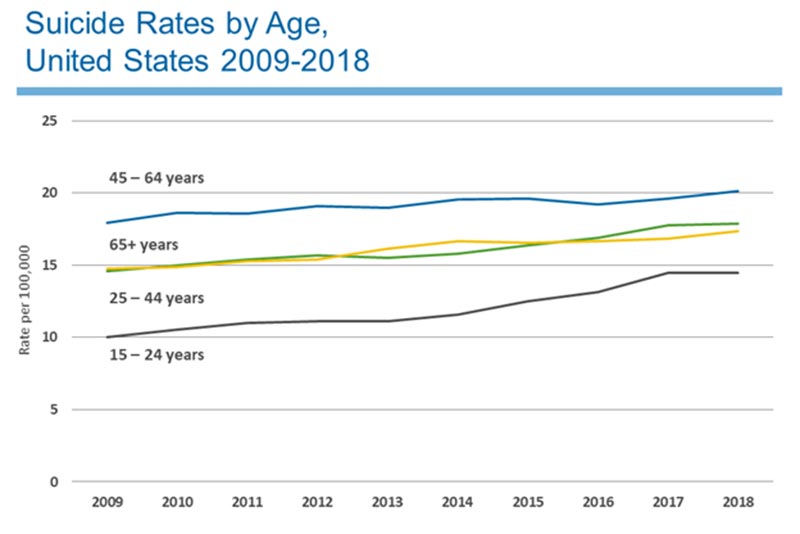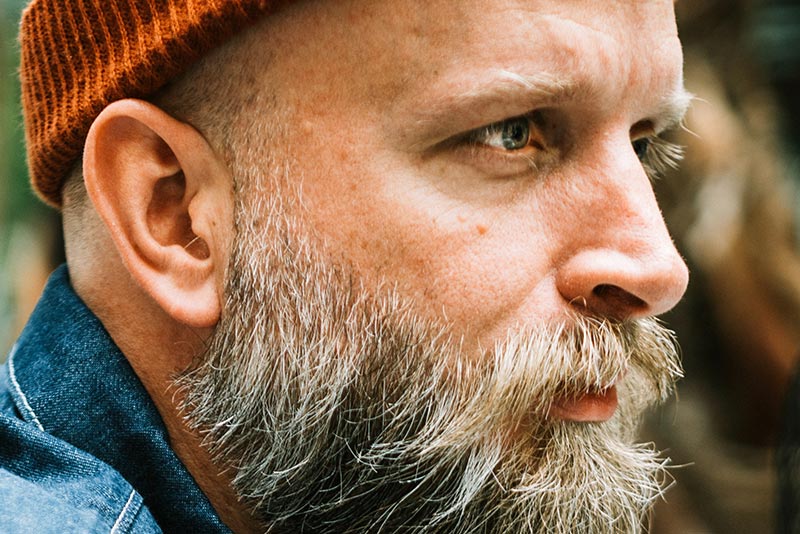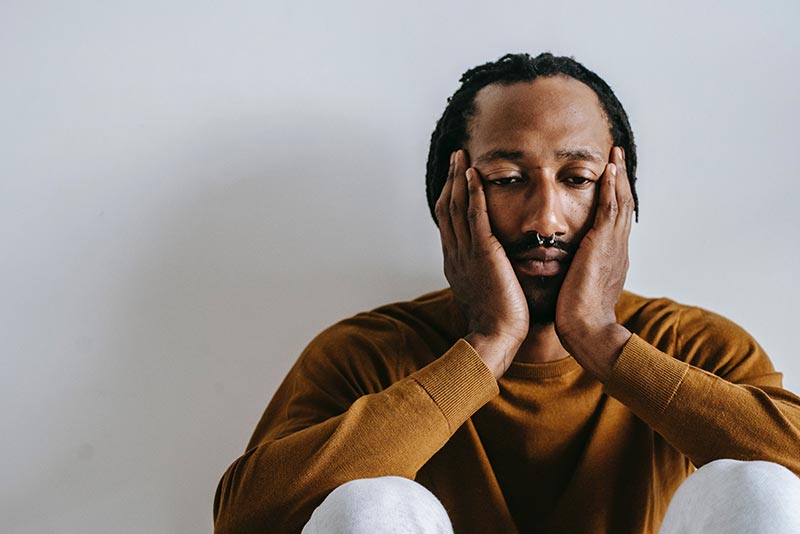By Jason Sleisenger, M.A. | CONTRIBUTOR |
Men’s mental health. Something that, in my experience, is hard to talk about. Even more, something that I’ve been criticized to bring up, especially in my youth.
“Man up” “Boys don’t cry” “Don’t be a p**y” “Have some b**ls” These are just a few of the things I’ve heard in my life and continue to hear about. Things are improving in this area, but there’s still more work to do.
There is currently another pandemic going on, one that has been occurring for quite some time. This pandemic is the men’s mental health pandemic, and for too long, it has been ignored, stigmatized, ostracized, and overlooked.
Men’s Mental Health is something that needs to be talked about more. That it’s ok for men to have feelings, and to express those feelings openly, in the manner that is most preferred.

Progress has been made over the last few years, with organizations devoted to Men’s Mental Health and Development needs and central areas of focus, such as the Mankind Project, the Good Man Project, ManTherapy.org, and specific chapters within Mental Health America and the National Institute on Mental Illness (NAMI) devoted to men specifically.
However, there is still much more work to do. As for any individual, mental health, more than ever, needs to be looked at as a priority in all facets of life, particularly for men.
Males account for some of the highest percentages of anxiety and depression in the country.
Mental health needs to be an unconditionally supported and embraced topic in work settings, places of leisure, and social organizations, particularly on behalf of men. There are too many men who are experiencing a “self-stigma” of being able to voice their needs and wants amongst family, friends, and coworkers. A culture of embraced dialogue regarding mental health not only benefits the individual, but all those who are connected to that person.
Suicide is the 10th leading cause of death in the United States, and it is estimated that 1.38 million Americans attempt suicide each year. On average, there are 130 suicides per day.
The rate of suicide at 69.38% is highest amongst middle-aged white men, particularly for men living in rural areas, where it is believed that mental health treatment stigma is highest for that population. In 2019, men died by suicide 3.63 times more often than women.
Below is a breakdown by age of suicide statistics between 2009 and 2018 from the CDC :

* In 2018, suicide was the second leading cause of death for youth and young adults (ages 10-34)
The National Violent Death Reporting System (NVDRS) keeps data on U.S. suicides. NVDRS 2015 data showed that, among men of all races, men over 65 were the most likely to die of suicides (27.67 suicides per 100,000), closely followed by men 40–64 (27.10 suicides per 100,000).
“We need to check in on the men in our life across all ages. There’s too much at risk if we don’t.”
Male Archetypes of 20th Century
Wellness must fully encapsulate the male experience. For centuries, male experiences have been epitomized by tenets of stoicism, self-sufficiency, and emotional repression. The ideal male archetypes of the 20th Century consisted of stoic figures such as the Marlboro Man, James Bond, and Generals Douglas MacArthur and George Patton. More ancient figures from which inspired these more contemporary figures consisted of classical stoic figures such as Socrates, Epictetus, and Marcus Aurelius.
These figures are not necessarily all bad. They got work done. They epitomized an innate sense of strength, seduction, and productivity. But there was little room for sensitivity. There is a need to address the softer side of men is readily apparent and is needed more than ever.
Marcus Aurelius
General George Patton
James Bond
We are currently living in an era of high automation, instant gratification technology that values speed and information, over slowness and feeling. We can order almost anything we need right to our doorstep. We are virtually interconnected, if we desire to be, through technology. I believe this is placing a further strain on men who feel that their productivity is not up to par with the societal expectation. This can add further stress, doubt, fear, anxiety, and depression. Men may feel like in order to keep up, they need to keep their sensitivities at bay.

We need to allow men to express their sensitivity. All men are capable of sensitivity. It is incumbent for individuals to make open expression of such sensitivity effective. Modern society has socialized men to hide this part of themselves, and thus, sensitivity has become a “shadow self,” or a hidden aspect of that lives in individuals but were often hide, as analytical psychologist Carl Jung would say. When men are not able to express a sensitivity, they learn to repress it, hide it, and make it taboo. As the saying goes, “every action has an equal and opposite reaction.” Thus, hiding sensitivity will not make it disappear, but rather, it can be channeled potentially in unhealthy ways and in risky behaviors, such as recklessness, substance abuse, and even interpersonal violence.
“There is no easy solution here, but at least improving the dialogue about it is a proper start.”
If we can talk about it, it will reduce stigma and make openness and feelings something second nature for men to feel a sense of freedom to explore it and not feel disconnected as a result.
Society functions better when all people are accounted for. For too long, we’ve viewed things from an individualist lens in Western society. It’s time we shift back to more of a collectivist viewpoint, where the wellness of others is as directly innate as our individual wellness. This collectivist culture will directly benefit men.
We have a chance to truly make men’s mental health a priority. The time for that priority is now.
Classical Stoic Effect on Modern Society

The most common mental health conditions that occur for men, yet are vastly underreported, are depression, anxiety, and loneliness. Rather than speak openly about their struggles, most men tend to hide these emotions, largely due to a sense of “self-stigma” that pervades over the consequences of being openly vulnerable, particularly with other men.
If you or a loved one is experiencing feelings of depression, anxiety, or any other forms of distress, seeking out professional counseling is a great first step. However, here are some general tips.
A great way to combat symptoms of depression in men in through forms of connection.
“Connection IS medicine.”
Calling, visiting, going out to eat, playing a sport together, or just scheduling time with a male friend is a simple yet powerful method to combat the loneliness that is plaguing millions of men, especially as we emerge from the COVID-19 pandemic. Many men are feeling disconnected and a simple, yet often overlooked strategy is to simply to connect with these men. Calling men and visiting men whom you know are living alone is one very strong place to start, as well as finding organizational activities, such as sports and other forms of leisure, can allow men to feel more comfortable discussing their feelings and feel a greater sense of connection and purpose with others.

Friends and acquaintances of men can also help to destigmatize the idea of men seeking help in the form of counselors and therapists but supporting those ideas as ways to build a sense of strength and improvement in men.
Why not call, text, or email men whom you have not spoken to in a while, or you are currently living alone. What if we were to normalize the experience of expressing emotions in men in a way that won’t be stigmatized or judged? How can we make the expression of sensitivity in men something that can be seen as an asset and gift for men themselves and those around them in their life?
On a personal level, men can consider looking into group-oriented therapies as well if they are specifically seeking out a sense of camaraderie in their wellness journey. In addition, men can find groups that they believe best resonate with them, whether that be in terms of particular activities and hobbies. There is also evidence that points to the improvement in men’s mental health after psychotherapeutic intervention.

As we emerge from the COVID-19 pandemic, it’s important that we as a society set our sights on the pandemic of depression, distress, and loneliness in men. If a culture can be created that not only normalizes but encourages a sense of looking after the wellness of all individuals, including men, this can only allow for a greater sense of positivity, innovation, and other forms of gifts that may otherwise never be made available to the world. The time to truly make mental health for all, and particularly for men, is now.
Below Are a List of Resources Which May Be Helpful for You or a Loved One:
By Jason Sleisenger, M.A. | CONTRIBUTOR |
Men’s mental health. Something that, in my experience, is hard to talk about. Even more, something that I’ve been criticized to bring up, especially in my youth.
“Man up” “Boys don’t cry” “Don’t be a p**y” “Have some b**ls” These are just a few of the things I’ve heard in my life and continue to hear about. Things are improving in this area, but there’s still more work to do.
There is currently another pandemic going on, one that has been occurring for quite some time. This pandemic is the men’s mental health pandemic, and for too long, it has been ignored, stigmatized, ostracized, and overlooked.
Men’s Mental Health is something that needs to be talked about more. That it’s ok for men to have feelings, and to express those feelings openly, in the manner that is most preferred.

Progress has been made over the last few years, with organizations devoted to Men’s Mental Health and Development needs and central areas of focus, such as the Mankind Project, the Good Man Project, ManTherapy.org, and specific chapters within Mental Health America and the National Institute on Mental Illness (NAMI) devoted to men specifically.
However, there is still much more work to do. As for any individual, mental health, more than ever, needs to be looked at as a priority in all facets of life, particularly for men.
Males account for some of the highest percentages of anxiety and depression in the country.
Mental health needs to be an unconditionally supported and embraced topic in work settings, places of leisure, and social organizations, particularly on behalf of men. There are too many men who are experiencing a “self-stigma” of being able to voice their needs and wants amongst family, friends, and coworkers. A culture of embraced dialogue regarding mental health not only benefits the individual, but all those who are connected to that person.
Suicide is the 10th leading cause of death in the United States, and it is estimated that 1.38 million Americans attempt suicide each year. On average, there are 130 suicides per day.
The rate of suicide at 69.38% is highest amongst middle-aged white men, particularly for men living in rural areas, where it is believed that mental health treatment stigma is highest for that population. In 2019, men died by suicide 3.63 times more often than women.
Below is a breakdown by age of suicide statistics between 2009 and 2018 from the CDC :

* In 2018, suicide was the second leading cause of death for youth and young adults (ages 10-34)
The National Violent Death Reporting System (NVDRS) keeps data on U.S. suicides. NVDRS 2015 data showed that, among men of all races, men over 65 were the most likely to die of suicides (27.67 suicides per 100,000), closely followed by men 40–64 (27.10 suicides per 100,000).
“We need to check in on the men in our life across all ages. There’s too much at risk if we don’t.”
Male Archetypes of 20th Century
Wellness must fully encapsulate the male experience. For centuries, male experiences have been epitomized by tenets of stoicism, self-sufficiency, and emotional repression. The ideal male archetypes of the 20th Century consisted of stoic figures such as the Marlboro Man, James Bond, and Generals Douglas MacArthur and George Patton. More ancient figures from which inspired these more contemporary figures consisted of classical stoic figures such as Socrates, Epictetus, and Marcus Aurelius.
These figures are not necessarily all bad. They got work done. They epitomized an innate sense of strength, seduction, and productivity. But there was little room for sensitivity. There is a need to address the softer side of men is readily apparent and is needed more than ever.
Marcus Aurelius
General George Patton
James Bond
We are currently living in an era of high automation, instant gratification technology that values speed and information, over slowness and feeling. We can order almost anything we need right to our doorstep. We are virtually interconnected, if we desire to be, through technology. I believe this is placing a further strain on men who feel that their productivity is not up to par with the societal expectation. This can add further stress, doubt, fear, anxiety, and depression. Men may feel like in order to keep up, they need to keep their sensitivities at bay.

We need to allow men to express their sensitivity. All men are capable of sensitivity. It is incumbent for individuals to make open expression of such sensitivity effective. Modern society has socialized men to hide this part of themselves, and thus, sensitivity has become a “shadow self,” or a hidden aspect of that lives in individuals but were often hide, as analytical psychologist Carl Jung would say. When men are not able to express a sensitivity, they learn to repress it, hide it, and make it taboo. As the saying goes, “every action has an equal and opposite reaction.” Thus, hiding sensitivity will not make it disappear, but rather, it can be channeled potentially in unhealthy ways and in risky behaviors, such as recklessness, substance abuse, and even interpersonal violence.
“There is no easy solution here, but at least improving the dialogue about it is a proper start.”
If we can talk about it, it will reduce stigma and make openness and feelings something second nature for men to feel a sense of freedom to explore it and not feel disconnected as a result.
Society functions better when all people are accounted for. For too long, we’ve viewed things from an individualist lens in Western society. It’s time we shift back to more of a collectivist viewpoint, where the wellness of others is as directly innate as our individual wellness. This collectivist culture will directly benefit men.
We have a chance to truly make men’s mental health a priority. The time for that priority is now.
Classical Stoic Effect on Modern Society

The most common mental health conditions that occur for men, yet are vastly underreported, are depression, anxiety, and loneliness. Rather than speak openly about their struggles, most men tend to hide these emotions, largely due to a sense of “self-stigma” that pervades over the consequences of being openly vulnerable, particularly with other men.
If you or a loved one is experiencing feelings of depression, anxiety, or any other forms of distress, seeking out professional counseling is a great first step. However, here are some general tips.
A great way to combat symptoms of depression in men in through forms of connection.
“Connection IS medicine.”
Calling, visiting, going out to eat, playing a sport together, or just scheduling time with a male friend is a simple yet powerful method to combat the loneliness that is plaguing millions of men, especially as we emerge from the COVID-19 pandemic. Many men are feeling disconnected and a simple, yet often overlooked strategy is to simply to connect with these men. Calling men and visiting men whom you know are living alone is one very strong place to start, as well as finding organizational activities, such as sports and other forms of leisure, can allow men to feel more comfortable discussing their feelings and feel a greater sense of connection and purpose with others.

Friends and acquaintances of men can also help to destigmatize the idea of men seeking help in the form of counselors and therapists but supporting those ideas as ways to build a sense of strength and improvement in men.
Why not call, text, or email men whom you have not spoken to in a while, or you are currently living alone. What if we were to normalize the experience of expressing emotions in men in a way that won’t be stigmatized or judged? How can we make the expression of sensitivity in men something that can be seen as an asset and gift for men themselves and those around them in their life?
On a personal level, men can consider looking into group-oriented therapies as well if they are specifically seeking out a sense of camaraderie in their wellness journey. In addition, men can find groups that they believe best resonate with them, whether that be in terms of particular activities and hobbies. There is also evidence that points to the improvement in men’s mental health after psychotherapeutic intervention.

As we emerge from the COVID-19 pandemic, it’s important that we as a society set our sights on the pandemic of depression, distress, and loneliness in men. If a culture can be created that not only normalizes but encourages a sense of looking after the wellness of all individuals, including men, this can only allow for a greater sense of positivity, innovation, and other forms of gifts that may otherwise never be made available to the world. The time to truly make mental health for all, and particularly for men, is now.
Below Are a List of Resources Which May Be Helpful for You or a Loved One:
Center for Disease Control
www.cdc.gov/mentalhealth
Phone: 1-800-232-4636
Food and Drug Administration
www.fda.gov
Phone: 1-888-463-6332
Freedom from Fear
www.freedomfromfear.org
Phone: 1-718-351-1717
Gift from Within
www.giftfromwithin.org
Phone: 1-207-236-8858
International Society for Traumatic Stress Studies
www.istss.org
Phone: 1-847-480-9028
US National Library of Medicine
www.medlineplus.gov
Phone: 1-301-402-8878
National Center for Posttraumatic Stress Disorder
www.ptsd.va.gov
Phone: 1-802-296-5132
National Institute of Mental Health
www.nimh.nih.gov
Phone: 1-866-615-6464
National Suicide Prevention Lifeline
www.suicidepreventionlifeline.org
Phone: 1-800-273-TALK (8255)
National Center for Victims of Crime
www.victimsofcrime.org
Phone: 1-202-467-8700
Screening for Mental Health (For Military)
screening.mentalhealthscreening.org/Military_NDSD
Phone: 1-781-239-0071
The Sidran Traumatic Stress Institute
www.sidran.org
Phone: 1-410-825-8888
Substance Abuse and Mental Health Services Administration
www.samhsa.gov/veterans-military-families
Phone: 1-800-789-2647
Smart Recovery
www.smartrecovery.org
Phone: 1-866-951-5357
Suicide Awareness Voices of Education
www.save.org
Phone: 1-800-273-8255
Veterans Crisis Line
www.veteranscrisisline.net
Phone: 1-800-273-8255
Veterans Health Administration
www.va.gov/health
Phone: 1-877-222-VETS (8387)
Nursing Home Abuse Justice
www.nursinghomeabuse.org/nursing-home-neglect/
Phone: 1-800-484-0316
Center for Disease Control
www.cdc.gov/mentalhealth
Phone: 1-800-232-4636
Food and Drug Administration
www.fda.gov
Phone: 1-888-463-6332
Freedom from Fear
www.freedomfromfear.org
Phone: 1-718-351-1717
Gift from Within
www.giftfromwithin.org
Phone: 1-207-236-8858
International Society for Traumatic Stress Studies
www.istss.org
Phone: 1-847-480-9028
US National Library of Medicine
www.medlineplus.gov
Phone: 1-301-402-8878
National Center for Posttraumatic Stress Disorder
www.ptsd.va.gov
Phone: 1-802-296-5132
National Institute of Mental Health
www.nimh.nih.gov
Phone: 1-866-615-6464
National Suicide Prevention Lifeline
www.suicidepreventionlifeline.org
Phone: 1-800-273-TALK (8255)
National Center for Victims of Crime
www.victimsofcrime.org
Phone: 1-202-467-8700
Screening for Mental Health (For Military)
screening.mentalhealthscreening.org/Military_NDSD
Phone: 1-781-239-0071
The Sidran Traumatic Stress Institute
www.sidran.org
Phone: 1-410-825-8888
Substance Abuse and Mental Health Services Administration
www.samhsa.gov/veterans-military-families
Phone: 1-800-789-2647
Smart Recovery
www.smartrecovery.org
Phone: 1-866-951-5357
Suicide Awareness Voices of Education
www.save.org
Phone: 1-800-273-8255
Veterans Crisis Line
www.veteranscrisisline.net
Phone: 1-800-273-8255
Veterans Health Administration
www.va.gov/health
Phone: 1-877-222-VETS (8387)
Nursing Home Abuse Justice
www.nursinghomeabuse.org/nursing-home-neglect/
Phone: 1-800-484-0316
Center for Disease Control
www.cdc.gov/mentalhealth
Phone: 1-800-232-4636
Food and Drug Administration
www.fda.gov
Phone: 1-888-463-6332
Freedom from Fear
www.freedomfromfear.org
Phone: 1-718-351-1717
Gift from Within
www.giftfromwithin.org
Phone: 1-207-236-8858
International Society for Traumatic Stress Studies
www.istss.org
Phone: 1-847-480-9028
US National Library of Medicine
www.medlineplus.gov
Phone: 1-301-402-8878
National Center for Posttraumatic Stress Disorder
www.ptsd.va.gov
Phone: 1-802-296-5132
National Institute of Mental Health
www.nimh.nih.gov
Phone: 1-866-615-6464
National Suicide Prevention Lifeline
www.suicidepreventionlifeline.org
Phone: 1-800-273-TALK (8255)
National Center for Victims of Crime
www.victimsofcrime.org
Phone: 1-202-467-8700
Screening for Mental Health (For Military)
screening.mentalhealthscreening.org/Military_NDSD
Phone: 1-781-239-0071
The Sidran Traumatic Stress Institute
www.sidran.org
Phone: 1-410-825-8888
Substance Abuse and Mental Health Services Administration
www.samhsa.gov/veterans-military-families
Phone: 1-800-789-2647
Smart Recovery
www.smartrecovery.org
Phone: 1-866-951-5357
Suicide Awareness Voices of Education
www.save.org
Phone: 1-800-273-8255
Veterans Crisis Line
www.veteranscrisisline.net
Phone: 1-800-273-8255
Veterans Health Administration
www.va.gov/health
Phone: 1-877-222-VETS (8387)
Nursing Home Abuse Justice
www.nursinghomeabuse.org/nursing-home-neglect/
Phone: 1-800-484-0316
– Jason Sleisenger, M.A.
Subscribe to get notifications about future articles.
About the Author: Jason Sleisenger, M.A. – Contributor
Master of Arts Graduate in Clinical Mental Health Counseling Northwestern University Class of 2021. I am based in Los Angeles. I possess a strong background in clinical research, performing arts, mixed reality applications, and outside the box thinking, and hope to integrate this into my professional practice as a mental health provider and career counselor. I’m fascinated by areas pertaining to the fields of spirituality, technology/Artificial Intelligence, entertainment, sports performance, law, active military and veterans, and the corporate sector. Pronouns: he, him, his. Yo hablo español. Words Matter, Feelings Matter, Mental Health Matters. Doing my part to help support others as best I can, and continually grow myself.


